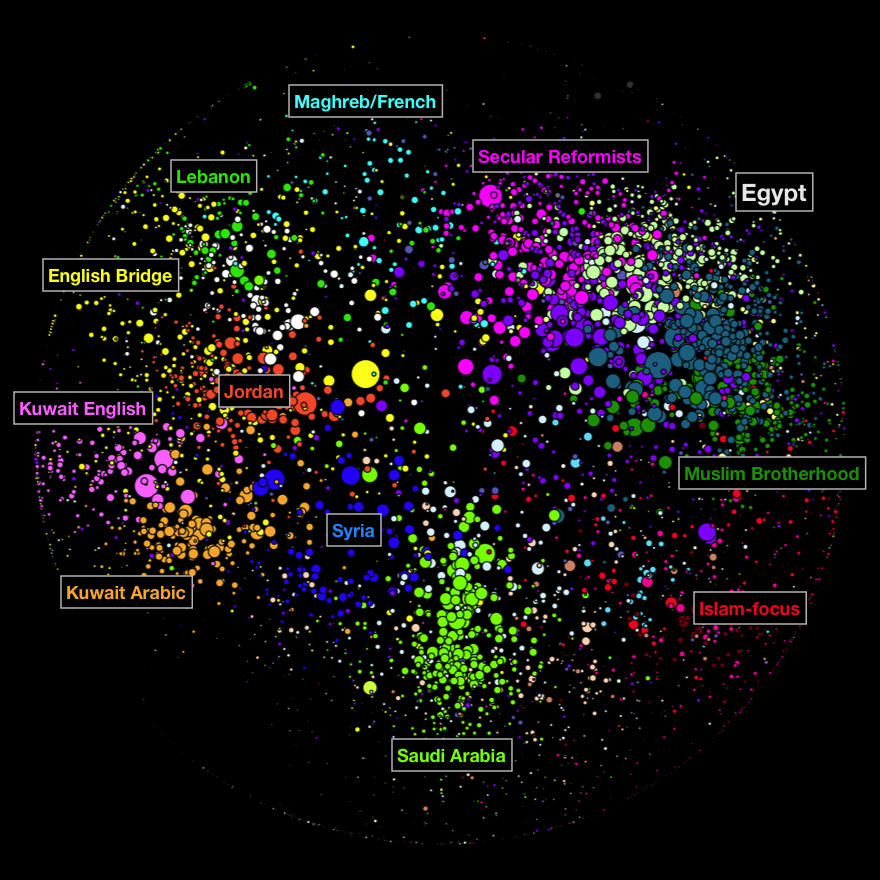Mapping the Arabic Blogosphere: Politics, Culture and Dissent (2009)
Filed under report | Tags: · blogging, culture, egypt, human rights, internet, islam, middle east, networks, politics, religion
“We conducted a study of the Arabic language blogosphere using link analysis, term frequency analysis, and human coding of individual blogs. We identified a base network of approximately 35,000 active blogs, created a network map of the 6,000 most connected blogs, and with a team of Arabic speakers hand coded 4,000 blogs. The goal for the study was to produce a baseline assessment of the networked public sphere in the Arab Middle East, and its relationship to a range of emergent issues, including politics, media, religion, culture, and international affairs.”
Authored by Bruce Etling, John Kelly, Rob Faris, John Palfrey, Internet and Democracy
Published by Berkman Center, June 2009
Internet & Democracy Case Study Series
Berkman Center Research Publication No. 2009-06
62 pages
Deibert, Palfrey, Rohozinski, Zittrain (eds.): Access Contested: Security, Identity, and Resistance in Asian Cyberspace (2011)
Filed under book | Tags: · asia, blogging, botnet, censorship, china, cyberwar, facebook, freedom of expression, internet, journalism, politics, surveillance

A daily battle for rights and freedoms in cyberspace is being waged in Asia. At the epicenter of this contest is China–home to the world’s largest Internet population and what is perhaps the world’s most advanced Internet censorship and surveillance regime in cyberspace. Resistance to China’s Internet controls comes from both grassroots activists and corporate giants such as Google. Meanwhile, similar struggles play out across the rest of the region, from India and Singapore to Thailand and Burma, although each national dynamic is unique. Access Contested, the third volume from the OpenNet Initiative (a collaborative partnership of the Citizen Lab at the University of Toronto’s Munk School of Global Affairs, the Berkman Center for Internet and Society at Harvard University, and the SecDev Group in Ottawa), examines the interplay of national security, social and ethnic identity, and resistance in Asian cyberspace, offering in-depth accounts of national struggles against Internet controls as well as updated country reports by ONI researchers.
The contributors examine such topics as Internet censorship in Thailand, the Malaysian blogosphere, surveillance and censorship around gender and sexuality in Malaysia, Internet governance in China, corporate social responsibility and freedom of expression in South Korea and India, cyber attacks on independent Burmese media, and distributed-denial-of-service attacks and other digital control measures across Asia.
Edited by Ronald Deibert, John Palfrey, Rafal Rohozinski, Jonathan Zittrain
Publisher MIT Press, 2011
Information Revolution and Global Politics series
ISBN 0262516802, 9780262516808
414 pages
Mark Bauerlein (ed.): The Digital Divide: Arguments for and Against Facebook, Google, Texting, and the Age of Social Networking (2011)
Filed under book | Tags: · blogging, digital divide, facebook, internet, twitter, web 2.0

This definitive work on the perils and promise of the social- media revolution collects writings by today’s best thinkers and cultural commentators, with an all-new introduction by Bauerlein.
Twitter, Facebook, e-publishing, blogs, distance-learning and other social media raise some of the most divisive cultural questions of our time. Some see the technological breakthroughs we live with as hopeful and democratic new steps in education, information gathering, and human progress. But others are deeply concerned by the eroding of civility online, declining reading habits, withering attention spans, and the treacherous effects of 24/7 peer pressure on our young.
With The Dumbest Generation, Mark Bauerlein emerged as the foremost voice against the development of an overwhelming digital social culture. But The Digital Divide doesn’t take sides. Framing the discussion so that leading voices from across the spectrum, supporters and detractors alike, have the opportunity to weigh in on the profound issues raised by the new media-from questions of reading skills and attention span, to cyber-bullying and the digital playground- Bauerlein’s new book takes the debate to a higher ground.
The book includes essays by Steven Johnson, Nicholas Carr, Don Tapscott, Douglas Rushkoff, Maggie Jackson, Clay Shirky, Todd Gitlin, and many more. Though these pieces have been previously published, the organization of The Digital Divide gives them freshness and new relevancy, making them part of a single document readers can use to truly get a handle on online privacy, the perils of a plugged-in childhood, and other technology-related hot topics.
Rather than dividing the book into “pro” and “con” sections, the essays are arranged by subject-“The Brain, the Senses,” “Learning in and out of the Classroom,” “Social and Personal Life,” “The Millennials,” “The Fate of Culture,” and “The Human (and Political) Impact.” Bauerlein incorporates a short headnote and a capsule bio about each contributor, as well as relevant contextual information about the source of the selection.
Bauerlein also provides a new introduction that traces the development of the debate, from the initial Digital Age zeal, to a wave of skepticism, and to a third stage of reflection that wavers between criticism and endorsement.
Enthusiasms for the Digital Age has cooled with the passage of time and the piling up of real-life examples that prove the risks of an online-focused culture. However, there is still much debate, comprising thousands of commentaries and hundreds of books, about how these technologies are rewriting our futures. Now, with this timely and definitive volume, readers can finally cut through the clamor, read the the very best writings from each side of The Digital Divide, and make more informed decisions about the presence and place of technology in their lives.
Introduction by Mark Bauerlein
Publisher Penguin Group US, 2011
ISBN 1101547529, 9781101547526
368 pages
PDF (updated on 2012-9-3)
Comment (0)

